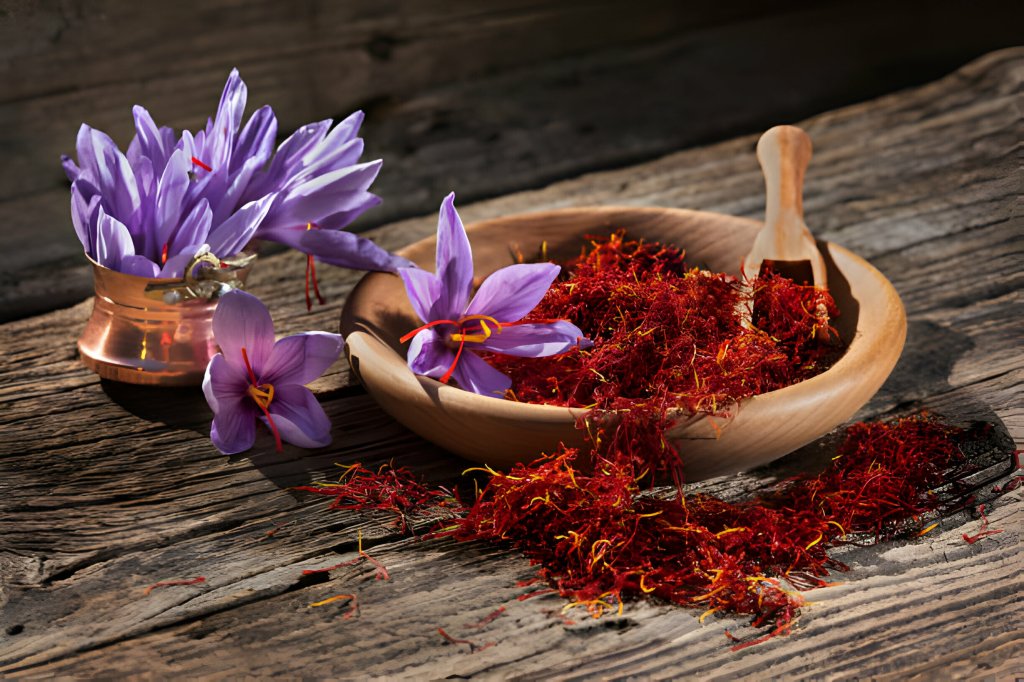Kashmiri Kesar, also known as saffron, is a prized spice derived from the crocus flower. Revered for its vibrant colour, distinct flavour, and numerous health benefits, Kashmiri Kesar holds a special significance in various religions and cultures, particularly in religious practices. Its rich history intertwines with spirituality, rituals, and medicinal uses, making it a revered element in religious ceremonies and traditions worldwide.

Significance in Religion:
Across different religions, Kashmiri Kesar holds symbolic importance and is integral to various religious practices. Its significance often stems from its rarity, exquisite aroma, and vibrant hue, which are associated with purity, divinity, and spirituality.
1. Hinduism:
In Hinduism, Kashmiri Kesar holds a sacred place and is offered to deities during worship rituals. It symbolises purity, prosperity, and auspiciousness. Saffron-infused offerings are made to gods and goddesses as a gesture of devotion and to seek their blessings. Additionally, saffron is used in traditional Hindu ceremonies such as weddings, which symbolise the marital bond’s purity and sanctity.
2. Buddhism:
Within Buddhist traditions, Kashmiri Kesar is highly esteemed for its spiritual significance. It is often used as a component in ceremonial offerings and rituals performed by monks and practitioners. Saffron’s vibrant colour is believed to represent enlightenment and the transformation of consciousness.
In Tibetan Buddhism, saffron is occasionally added to ceremonial water, symbolising purification and spiritual awakening.
3. Islam:
Kashmiri Kesar is mentioned in Islamic traditions and holds significance in certain rituals and practices. While not as extensively used in religious ceremonies as in Hinduism or Buddhism, saffron is valued for its aroma and flavour in Islamic cuisine, especially during festivals such as Eid al-Fitr and Eid al-Adha. It is also believed to have medicinal properties, as mentioned in the Hadith literature.
Uses and Benefits:
Besides its religious significance, Kashmiri Kesar is renowned for its countless health benefits and culinary uses. Its therapeutic properties have been recognised for centuries, making it a valuable in traditional medicine systems such as Ayurveda and Unani.
Saffron Benefits: –
1. Rich in antioxidants:
Kashmiri Kesar contains compounds like crocin and safranal, which possess potent antioxidant properties. These antioxidants help combat oxidative stress, reduce inflammation, and protect against chronic diseases.
2. Improves mood:
Saffron has been linked to improving mood and lowering the symptoms of depression and anxiety. It incites the production of serotonin, a neurotransmitter associated with happiness and well-being.
3. Benefits for Skin:
The antioxidant properties of saffron make it a valuable ingredient in skincare formulations. It helps combat free radicals, reduce oxidative stress, and rejuvenate the skin. Kashmiri Kesar is often used in face masks, creams, and oils to brighten complexion, fade dark spots, and impart a natural glow. Its antimicrobial properties also make it effective against acne and blemishes.
4. Enhances cognition:
Studies suggest that saffron may improve cognitive function and memory retention. Its neuroprotective effects help prevent age-related cognitive decline and promote brain health.
5. Promotes heart health:
Consuming Kashmiri Kesar may reduce blood pressure, improve blood lipid, and reduce the risk of affecting the heart and blood vessel diseases. Its anti-inflammatory properties contribute to overall heart health.
6. Benefits during Pregnancy

Saffron is considered beneficial for pregnant women when consumed in moderation under medical supervision. It helps relieve symptoms of morning sickness, improve appetite, and boost haemoglobin levels. Additionally, saffron-infused milk is believed to promote lactation and aid postpartum recovery. However, it is essential to note that consulting a healthcare professional is crucial before consuming saffron during pregnancy.
Culinary Uses:
Flavour enhancer:
Kashmiri Kesar adds a unique flavour and aroma to dishes, making it a prized ingredient in various cuisines worldwide. From savoury dishes like biryanis and curries to sweet delicacies like kheer and ice cream, saffron elevates the taste profile of a wide range of recipes.
Natural food colouring:
The vibrant orange-red hue of Kashmiri Kesar makes it a popular natural food colouring agent. It is used to impart colour to dishes, beverages, and desserts, replacing synthetic dyes and additives.
Genuine vs. Imitation:
Always opt for Genuine Kashmiri Kesar with a deep red colour and a subtle honey-like aroma. Avoid vibrant red strands, which may be adulterated with artificial colours.
Dosage:
A little goes a long way. Typically, a few strands are sufficient for culinary or medicinal purposes. Consult an expert or professional doctor for specific dosages and recommendations.
Side Effects:
Saffron is generally safe; sometimes, it can cause side effects like stomach distress or allergic reactions in high doses.
Conclusion:
With its rich history, religious significance, and diverse benefits, Kashmiri Kesar continues to captivate people’s imagination and reverence. Beyond its role in religious ceremonies and rituals, saffron’s medicinal properties and culinary uses have earned it a special place in cultures worldwide. As we delve deeper into its spiritual and health benefits, the allure of Kashmiri Kesar remains timeless, symbolising purity, prosperity, and well-being.
FAQs
Q1. Why is Kashmiri Kesar so important in religion?
A1. Kashmiri Kesar’s significance stems from its association with purity, auspiciousness, and divine blessings. Its vibrant colour and rarity elevate it beyond a spice, making it a symbol used in various religious practices across Hinduism, Buddhism, Jainism, Islam, and Christianity.
Q2. Can Kashmiri Kesar improve my skin?
A2. Kashmiri Kesar holds potential benefits for skin health due to its antioxidant and anti-inflammatory properties. It may help reduce hyperpigmentation and promote a radiant complexion. However, it’s crucial to consult a dermatologist before applying it to the skin.
Q3. Is Kashmiri Kesar safe to consume during pregnancy?
A3. Talking to a healthcare professional before consuming Kashmiri Kesar during pregnancy is essential. While some research suggests it may possess uterine stimulant properties potentially beneficial in specific situations, it’s important to seek medical recommendations before using it.
Q4. Can Kashmiri Kesar help with mood swings?
A4. Early research indicates that Kashmiri Kesar may have mood-lifting properties and could potentially manage symptoms of mild depression and anxiety. This might be related to its influence on neurotransmitters in the brain. However, more research is required to confirm its effectiveness.



Leave a comment